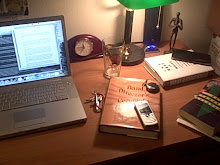I am now a certified BSA Climbing Director - which sounds awfully spiffy until you realize it's really no different than what I've been doing for the past 5 years, only instead I get to do all the site inspections myself an sign off on my own stuff (I still am subject to inspection from an annual "visitation team," however). Oh, and I get to train staff... which my camp can't support beyond Mike and myself, but it was a lot of fun, and will take a bunch of hassle out of my summers for the next five years.
I was thrown in a patrol with 13 other college aged kids (21 is the minimum age for a director) based on our program. We spent the week wading through powerpoint presentations and trying to stay awake as they piled on the mandatory standards and regulations, alternating with time spent out on the granite, setting protection and building anchors. We were in the high desert, somewhere between Temecula and the Salton Sea and I had expected it to be sweltering, but instead the temperatures lurked in the sixties and dropped into the forties at night. Although we weren't caught unprepared, I was certainly surprised by the weather. Whatever free time my patrol had was spent in the camp's dining commons, trying to warm ourselves in the shadow of the artificial rock wall, sipping inordinate amounts of coffee and benignly taunting our patrol's one LDS kid in a caffeinated blur. Beyond that, we were only expected to act in a sufficiently dorky fashion, putting together skits and songs for campfire and developing rivalries between programs and patrols.
The camp we stayed at was on a reservation, leased from a tribe. After driving through ten miles of what they insisted was a road, through nothing but scrub and dirt, the camp opened up into a meadow and valley floor filled with oak trees. The valley, "Lost Valley" was most impressive at night, when the wind died and huge banks of what could only be described as slasher-movie grade fog rolled in. The moon cut through the clouds and illuminated the far side of the valley, mountains seemingly caught above and below two sets of clouds.
Both the program and the site were impressive, but what left the greatest impression on me over the week was a story told by one of the staff, as the fog banks rolled in one evening and we headed inside the dining commons for our "campfire:"
The tale's teller recalled a conversation he had had long ago with a Cupeño woman, one of the Native Americans from the reservation. She had been born in 1890 and up through the great depression had travelled with her tribe to this valley (which they called Wiatava, "the valley of the live oaks") every summer to collect acorns and grind them to meal against the rocks. The work had been deemed women's work, and it was a social activity. These summers were where she learned stories and songs, and the majority of her heritage, sitting around with the other women, grinding the acorns in bowls in the granite, worn over generations of this activity. She was being interviewed because the tribe was in negotiations to lease the land of the valley, and opinions varied as to whether this should or should not be done.
Those against leasing the land cited that it was Sacred, and the tale's teller was confused. He asked if there were rites conducted in the summers here in the valley or if spirits lived there. The old woman sighed and smiled. Apparently there is no similar word for her feelings in English other that Sacred. It was not something mystical or religious, but the importance of the land was great. She tried to explain: The valley was important to her when she was there, but it was more important to her when she wasn't there. This was where she grew up and the memories of it where part of what made her who she was. To her and to many others, the valley was sacred.

I smiled when I heard this story because I knew exactly what she had meant. I had used the word to describe Cody before, but had never heard the word defined so perfectly.
After spending seven years there as a scout, and another 6 as an adult, I've been heading into Cody each summer for over half of my life. Cody is an institution, steeped in tradition. The camp breeds a culture that keeps the kids coming back until they age out at 18. - and adults coming back long after their sons have gone off to college. Cody was where I developed friendships that had a definite impact on how I define myself. Beyond the institution however, the land itself commands reverence. Cody Lake and the three tiny cabins that make up the camp is a place that has shaped who I am. It is a place that I carry with me and it is a place to which I will return long after my affiliation with the troop or camp fades.
